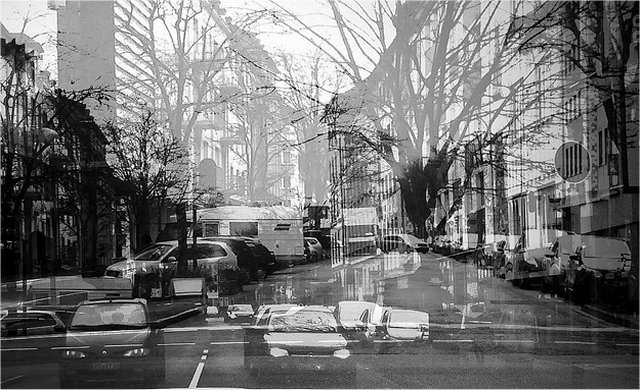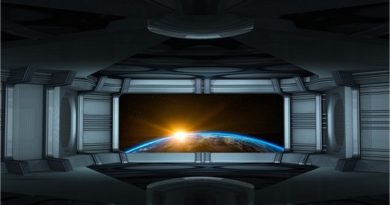Cola Hard Cash
By Bronwyn Mauldin
Stephanie scanned the East L.A. Community College parking lot as she pulled in. A guy in a red baseball cap stood on the far sidewalk, back to her, staring into one of the abandoned classroom buildings. She was beginning to wonder if, for once in his furtive little life, Marcus was going to be late. Then the guy turned. It was him.
When Marcus spotted her dark blue Honda Civic four-door he folded his arms across his chest. Stephanie motioned for him to come get in the car. He shook his head. She took a deep breath, turned off the engine and climbed out.
“It’s not going to work,” Marcus said as she walked up. “Give me the money and I’ll take care of it myself.”
God damn him. It was exactly what she’d expected. “No. I told everybody I’d go with you.” She had no intention of letting him walk away with three hundred dollars of the collective’s cash. “It wouldn’t be right to make you take all the risk on your own.” She tried to sound concerned.
“I told you to borrow somebody else’s car. They can track you down from your license plates.”
“I should let them trace it to someone else?” she snapped. Of course he’d do that, cover for himself by putting other people on the line. Marcus and Stephanie stared at each other for a long moment.
“You don’t have a clue what you’re getting into,” Marcus said.
She rolled her eyes. His arrogant paranoia made her laugh at the best of times. Right now, it was pissing her off. “What don’t I know?” Stephanie said. “That breaking the laws against solar power is dangerous as hell?”
Two years before, when the state outlawed solar, it was Stephanie who’d pulled together the group of activists who were angry enough to risk going to prison. She knew an out-of-work photovoltaics expert who taught them how to make solar panels with the new silicon paint technology. She’d found a disaffected electrician with a vivid sense of social justice. In fact, if that electrician hadn’t vouched for Marcus, he wouldn’t even be here. Not in the Autonomous Fuel Cell collective Stephanie had created.
“I reckon the ones with money in their pockets always hold the trump card,” Marcus said. Sure, he was street smart and resourceful, but he thought living in a squat and eating out of dumpsters made him superior to anyone who lived in the cash economy. Meaning every other member of the Fuel Cell, but especially her. She was the only one of them who actually owned her home.
“If you were one of my clients, I’d kick your ass,” she said.
Stephanie was a public defender, and she knew exactly what she’d gotten into. She knew which laws they were breaking every time they installed one of their handmade solar panels and secretly took another Los Angeles building off the electrical grid. She knew the length of prison term to expect if they were caught. That’s why the collective had rules, why they didn’t break any more laws than they had to. Before driving out here today she’d looked up the mandatory minimum for buying silicon without a license. Fifteen years, no parole.
But they didn’t have a choice. Without the silicon paint, they couldn’t build their panels, and without the panels, there was no Fuel Cell.
Stephanie turned her back to Marcus. “Get in the car.” She walked away and didn’t look back.
Marcus followed, just as she knew he would. He might be 25 years old, but there were times when he acted just like the kids she represented in juvenile court. It helped that she had ten years worth of life experience on him.
When he was in the passenger seat Marcus carefully removed the headphones from his ears and slipped them into a side pocket of his orange messenger bag. He took off the baseball cap and ran his fingers through his short black hair, making it stick out in uneven static spikes. Not for the first time, Stephanie wondered if he might dye it. That wouldn’t seem to fit with his so-called “freegan” lifestyle, but it was awfully black for a white guy.
“Nice hat,” Stephanie said, pleased with her small victory. “You usually wear that charming black toboggan.”
“Camouflage,” he said.
Another day, she might have laughed, even if he was serious. “I see,” she said. Still, she couldn’t help but needle him a little more. “What if somebody recognizes your signature messenger bag?”
He looked at the bag in his lap, seeming to consider it for a moment. Then he shoved it down between his feet. “There. Better?”
“Super.” Stephanie started to pull away. “Tell me where we’re headed.”
Marcus pulled a scrap of paper out of his jeans pocket, unfolded it carefully and read it in silence. Then he tore it into halves over and over again until he had eight equal pieces. He placed them on his tongue like communion wafers, one after another, and chewed slowly. Stephanie frowned, trying not to show her irritation. Not at chewing the paper, which was a filthy habit, so much as the silly melodrama.
“Okay.” He swallowed. “Take a left on Eastern Avenue and go about a mile and a half. Then left on Telegraph Road.”
Marcus directed her five miles southeast through Commerce, Montebello and Pico Rivera, a few of the ninety-some independent municipalities of the greater Los Angeles urban agglomeration. They passed through the green space of Whittier Narrows where an optimistic soul still grew half an acre of strawberries in the shade of electricity pylons by the side of the six lane road. Then into the crumbling low-income community of Downey.
Timing of the Paramount Boulevard traffic lights had gone off by a few seconds, and they were caught by nearly every one.
“Hey, check out up there” Marcus said, pointing to a warehouse as they passed. “Old fashioned solar panels.”
Stephanie slowed to look up at a long row of rusty metal sheets balanced precariously on spindly legs. Several were listing to the side, and one was bent almost in half. Worn out old panels from the heyday of solar power. Not so long ago they’d been a familiar sight. So familiar, in fact, that Stephanie hardly noticed them any more.
“And?”
Marcus said, “Those are pure silicon wafers up there. We should go get them one night.”
“Absolutely not!” Stephanie said. “They’ll put you away for a long time if the cops catch you with that stuff.”
“Cops? Forget about LAPD. It’s electric company paramilitaries you need to watch out for.”
That again. There were persistent rumors that the state law making solar power illegal had also established a private, quasi-police force that reported directly to the electric companies. Marcus said they were recruiting ex-mercs straight out of tours of duty in the Mideast Colonies. Stephanie couldn’t find any law authorizing an electric company police force, but that didn’t necessarily mean it didn’t exist. Patriot Act IV – or maybe number V – had exempted all legislation pertaining to “critical infrastructure” from public hearings. The states could pass any laws they wanted about the electrical grid without telling the public.
“Don’t do anything stupid, Marcus” Stephanie said. “If you get caught, that puts all of us in the Fuel Cell in danger.”
The whole idea was absurd. Electric company police? It sounded as ridiculous as Sesame Street SWAT teams or Teletubby constables.
Then again, Stephanie could remember a time when the idea of the state banning solar power seemed just as ridiculous. It had been too popular, too widespread. And yet, here she was driving Marcus to meet with a second-tier organized crime syndicate, to buy the silicon paint they needed for the Autonomous Fuel Cell’s quixotic effort to take L.A. off the electrical grid, one building at a time.
⊕
Click below for next page…




